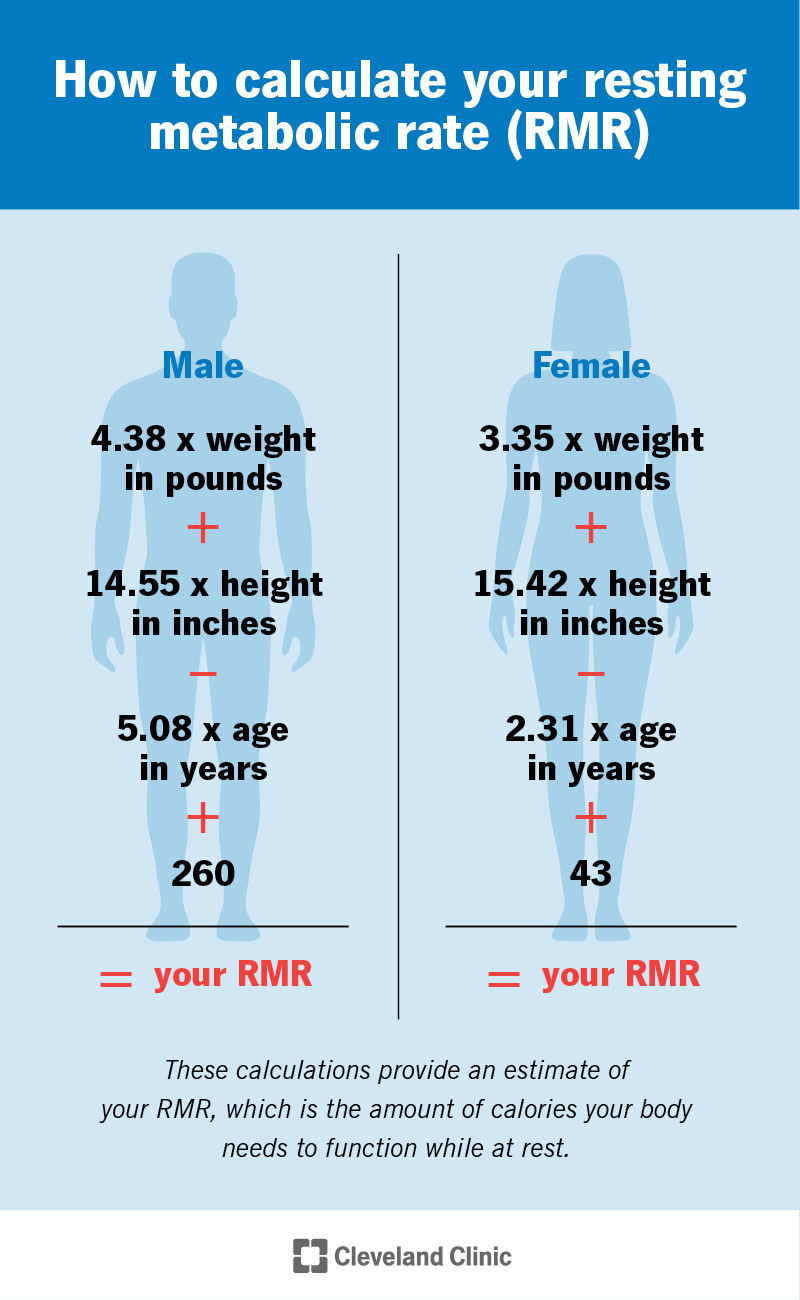Your basal metabolic rate (BMR) is one of three ways your body uses calories. It’s the number of calories your body needs to function at a basic level. Several factors influence your BMR, and the rate is different for everyone. Certain equations can help you estimate your BMR based on your sex, weight, height and age.
Advertisement
Cleveland Clinic is a non-profit academic medical center. Advertising on our site helps support our mission. We do not endorse non-Cleveland Clinic products or services. Policy

Image content: This image is available to view online.
View image online (https://my.clevelandclinic.org/-/scassets/images/org/health/articles/basal-metabolic-rate-bmr)
Your basal metabolic rate (BMR) refers to the minimum number of calories your body needs to function at a basic level. This includes maintaining all your cells and essential bodily functions, like breathing, blood circulation and body temperature. BMR varies from person to person based on several factors.
Advertisement
Cleveland Clinic is a non-profit academic medical center. Advertising on our site helps support our mission. We do not endorse non-Cleveland Clinic products or services. Policy
Your BMR is your body’s major source of energy expenditure. It fulfills 60% to 70% of the total energy your body uses. Your body uses about 10% of its total energy to process food into fuel. The remaining energy fuels your physical movement.
You may want to learn more about BMR to help manage your weight. It can help provide a general understanding of what your body needs to function. But know that your BMR is just one piece of the puzzle when it comes to weight management and calorie usage.
Several factors influence your basal metabolic rate, including:
Advertisement
Temporary situations that can affect your BMR include:
Life stages that affect your BMR include:
There’s no such thing as “normal” when it comes to basal metabolic rates. Each person has a BMR unique to their body based on various factors. Scientists can only provide averages when it comes to BMR.
The average male has a BMR of around 1,696 calories (7,100 kilojoules) per day. The average female has a BMR of around 1,410 calories (5,900 kilojoules) per day. These estimates may change based on your race and/or ethnicity.
It’s important to remember that this energy (calorie) expenditure only involves the energy your body needs to maintain its basic functioning. These numbers don’t include the calories your body needs to turn food into energy and for physical activity.
If you have questions about how many calories you should consume in a day, it’s best to talk to your healthcare provider or a registered dietitian. They can help you calculate a realistic number based on your unique circumstances.
It’s most accurate to measure your BMR in a lab setting under very strict conditions. More specifically, an expert would calculate your BMR while you’re:
Advertisement
Because most people don’t have access to this kind of testing, scientists have developed equations to estimate your BMR. The most commonly used equation is called the Harris-Benedict equation:
You may see or hear about resting metabolic rate (RMR) calculations. RMR and BMR are similar but different. RMR represents the amount of energy your body needs to function while at rest. But it includes the calories necessary for low-effort daily activities like going to the bathroom and getting dressed. RMR is slightly higher than BMR by about 10% due to the calorie needs of these low-energy activities.
Equations to estimate RMR include:
In many ways, there’s not much you can do to change your BMR. You can’t alter several factors that contribute to your BMR, like your genetics, age and height. One healthy way to increase your BMR is to build lean muscle mass. This increases your BMR because lean muscle tissue requires significant energy to maintain its structure.
Advertisement
Incorporating regular resistance training and strength-training exercises into your routine (which are different from aerobic exercise) can help build lean muscle. Examples of these types of exercise include lifting weights, Pilates and kettlebell training.
Having a very fast metabolism (BMR) isn’t always a good thing. For example, a condition called hypermetabolism can happen when someone has a serious illness, like cancer. Also, things like hyperthyroidism or taking certain stimulants can make your metabolism faster, but they can also be harmful to your health.
If you have questions or concerns about your metabolism and how it affects your weight and health, reach out to your healthcare provider.
Understanding your BMR is a great first step toward taking charge of your weight and health. While it’s true that you can only change your BMR a little, it’s an important piece of the bigger picture. If you’re curious about your body and want to learn more about what influences your weight, don’t hesitate to reach out to your healthcare provider or metabolism experts. They can help you create a personalized plan that’s tailored to your unique body and goals, setting you up for success on your journey to better health.
Advertisement

Sign up for our Health Essentials emails for expert guidance on nutrition, fitness, sleep, skin care and more.
Learn more about the Health Library and our editorial process.
Cleveland Clinic’s health articles are based on evidence-backed information and review by medical professionals to ensure accuracy, reliability and up-to-date clinical standards.
Cleveland Clinic’s health articles are based on evidence-backed information and review by medical professionals to ensure accuracy, reliability and up-to-date clinical standards.
Hormonal conditions can be tricky to find and complicated to treat. The experts in endocrinology at Cleveland Clinic are here to provide the best care.
